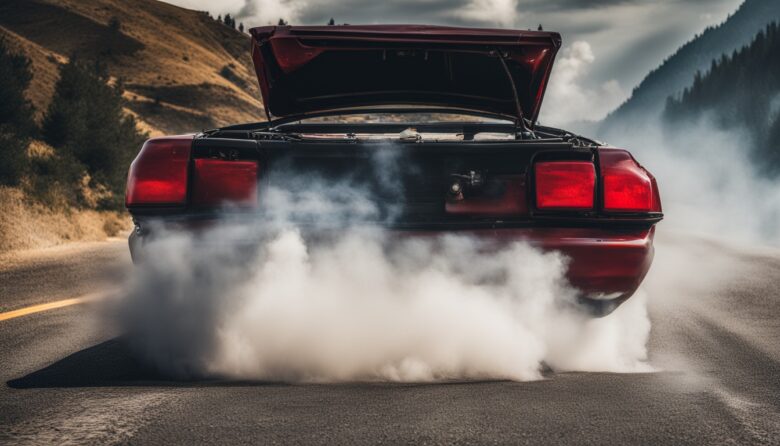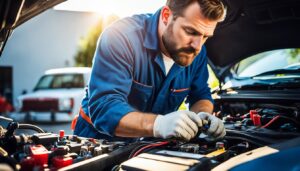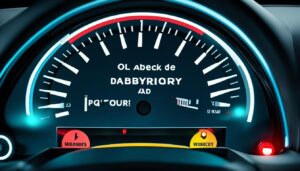Have you ever been stuck on the side of the road, with steam coming from under the hood? Engine overheating is a common issue that can cause serious damage if not fixed quickly. But what causes it, and how can you stop and fix it?
This guide will cover the main reasons for engine overheating and offer ways to prevent and solve it. We’ll look at cooling system failures and thermostat problems. By learning how to find and fix these issues, you can avoid expensive repairs and keep your engine running well.
Key Takeaways
- Engine overheating can be caused by many things, like coolant issues, thermostat failures, and radiator problems.
- It’s important to notice early signs of overheating, such as the temperature gauge going up and other signs, to prevent more damage.
- Regular checks of the coolant and the cooling system can help prevent overheating.
- Changing how you drive, like not using the air conditioner too much in hot weather, can also help prevent overheating.
- Fixing problems quickly and addressing any underlying issues is key to keeping your engine running well.
What Causes Engine Overheating?
Engine overheating is a common issue that can have serious consequences if left unaddressed. Two main culprits are coolant issues and thermostat failure1.
Coolant Issues
Coolant leaks or an improper coolant mix can cause the engine to overheat. If you ignore the cooling system, it can lead to serious damage or even engine failure1. Keeping up with cooling system maintenance can prevent overheating1. Faulty belts or hoses can also cause engine overheating1.
Thermostat Failure
A bad thermostat can disrupt coolant flow, leading to overheating. In fact, a faulty thermostat can cause up to 25% of engine overheating incidents2. It’s important to fix these issues to prevent engine damage.
| Cause of Engine Overheating | Percentage Contribution |
|---|---|
| Water pump problems | 33% |
| Thermostat malfunction | 25% |
| Coolant-related issues | 20% |
| Radiator problems | 15% |
| Adding extra coolant/water as a quick fix | 10% |
Regular checkups and visual inspections can spot cooling system problems early1. Taking steps to maintain your car’s cooling system is key to preventing overheating and keeping your car running smoothly1.
Radiator Problems
The radiator is key to your car’s cooling system, helping to cool the engine. But, it can sometimes fail, leading to engine overheating. Problems like a cracked cap, leaky hoses, a broken fan, or a rusty radiator can stop it from cooling the engine properly3.
A bad water pump can also cause overheating by not moving coolant well3. Low coolant from leaks can also lead to overheating3. And if the thermostat fails, it can’t control the engine’s temperature, making things worse3.
| Radiator Issue | Potential Impact |
|---|---|
| Cracked radiator cap | Reduced coolant pressure, leading to overheating |
| Leaky radiator hose | Coolant loss, causing overheating |
| Broken radiator fan | Inadequate cooling, resulting in overheating3 |
| Rusty radiator | Reduced heat dissipation, leading to overheating |
Keeping the radiator and its parts in good shape is key to avoiding overheating. Regular checks, like making sure coolant levels are right, flushing the radiator, and looking for worn belts and hoses, help keep it working right3.
Fixing radiator problems quickly helps keep your engine at the right temperature. This avoids the high costs of engine overheating23.
Engine Overheating
When an engine gets too hot, it can damage important parts like the head gasket, pistons, and valves4. This can lead to the engine failing completely. It’s important to find and fix the overheating problem quickly to avoid big repairs or needing a new engine.
A normal car engine runs between 195°F and 220°F5. But if it overheats, the temperature can go way up. This can make the radiator fluid boil, causing steam or white smoke to come out5.
There are many reasons why an engine might overheat, like low coolant or a broken thermostat5. Fixing these issues fast is key to keeping the engine safe. Drivers should watch for signs like a temperature gauge light or strange noises from the engine.
To stop engine overheating, keep the cooling system in good shape with regular maintenance5. This means flushing the radiator and changing the coolant as needed. Getting help from a trusted mechanic, like those at Chapel Hill Tire, can also prevent bigger engine problems5.
“Addressing a car’s overheating problem promptly is essential to avoid extensive engine damage and costly repairs.”
By being careful, keeping up with maintenance, and getting help when needed, drivers can protect their cars from engine overheating damage45.
Signs of Overheating
It’s key to spot early signs of engine overheating to avoid more damage. We should watch for the temperature gauge, visual signs, and sounds.
Temperature Gauge Warning
The temperature gauge hitting the red zone or almost reaching the top is a clear sign of overheating6. This means the engine is getting too hot and needs quick action.
Visual and Auditory Cues
Other signs include steam from the hood or a burning smell, which could mean coolant is boiling or there are heat issues6. Hearing thumping or ticking sounds, or seeing coolant leaks, also points to overheating6.
Loss of power or a hood too hot to touch are more signs of overheating6.
| Symptom | Cause |
|---|---|
| Insufficient Transmission Fluid | Low levels of transmission fluid can lead to overheating. Adequate fluid is essential for lubricating and cooling transmission components, preventing increased friction and overheating7. |
| Transmission Fluid Leaks | Leaks from damaged seals, gaskets, or cooler lines are significant causes of transmission overheating. Reduction in fluid levels due to leaks diminishes cooling and lubrication capabilities, contributing to high transmission temperatures7. |
| Overworking the Transmission | Excess stress from activities like towing heavy loads or driving in challenging terrains can lead to transmission overheating. Heavy workloads increase heat generation in the transmission7. |
| Burning Odor | A strong burning smell is a key indicator of an overheating transmission. This odor arises from breakdown of transmission fluid due to heat, leading to increased friction and heat, and possible oxidation. Prolonged driving aggravates the issue7. |
| Fluid Leaks | Overheating stress on seals and gaskets can cause leaks, resulting in red or brown fluid pooling, which compromises transmission lubrication, cooling, and hydraulic functions, leading to increased friction and poor performance7. |
| Slipping Gears | Overheating can cause gears to slip or not engage correctly, impacting acceleration, power, and gear shifts. Delays in acceleration, lack of power, and jerking during gear changes are common symptoms of an overheating transmission7. |
| Warning Lights | Transmission temperature, Check Engine, and Engine Temperature warning lights can indicate overheating. Transmissions rely on the engine cooling system; overheating can strain the engine’s cooling system, potentially leading to engine overheating7. |
| Unusual Noises or Vibrations | Internal component damage due to overheating can cause abnormal sounds like grinding or whining. Vibrations felt in the transmission area or throughout the vehicle signal compromised component functionality due to excessive heat and wear7. |
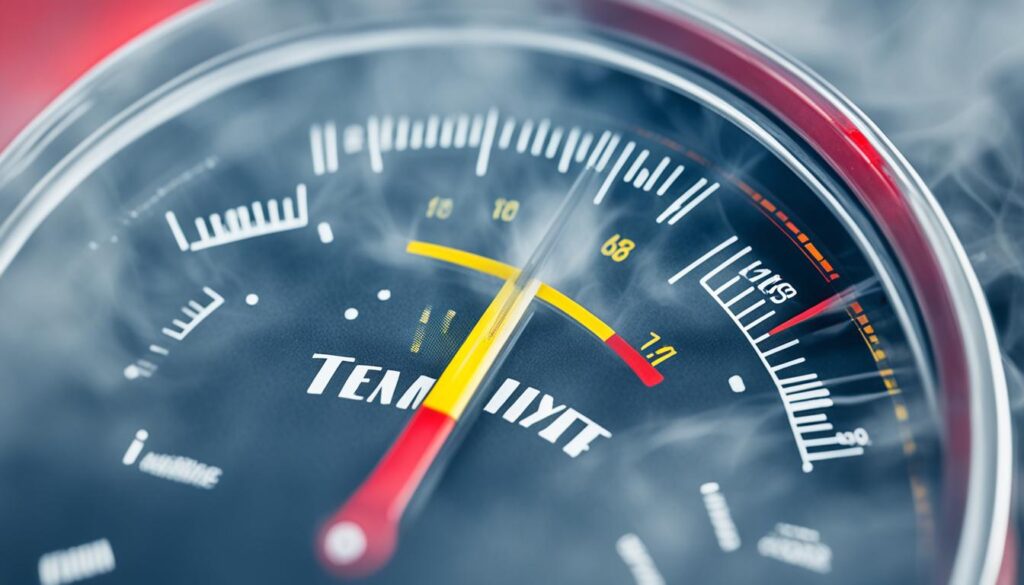
Knowing these signs helps us spot and fix overheating issues fast. This prevents further damage and saves on repairs67.
What to Do When Your Engine Overheats
If you see your temperature gauge rising or steam from the hood, pull over safely and turn off the engine8. Driving on can cause big damage, so act fast9.
After pulling over, wait 15 minutes before checking the coolant. Opening the hood too soon is risky because of the steam or coolant8.
Call for roadside help or a tow to a repair shop9. Don’t drive further to avoid engine damage9.
While waiting, turn on the heater to cool the engine8. But don’t open the hood yet, it’s not safe8.
Overheating can be from many things like clogged hoses or a broken fan8. Keeping up with maintenance and watching for overheating can save you from big repairs89.
Preventing Engine Overheating
Regular Maintenance
Keeping your car’s cooling system in check is key to avoiding engine overheating. Make sure to check fluid levels, flush the coolant as the maker suggests, and follow your owner’s manual for maintenance10. Changing the oil regularly is a top way to stop overheating and damage to your engine10. Also, getting your cooling system checked by a pro can spot and fix issues early.
10 The cooling system often causes engine overheating, pointing out a main issue10. To stop overheating, park in the shade and use window shades10. Tips on using the car’s A/C to manage heat are also given.
10 Keep an eye on the temperature gauge to catch overheating early10. It’s important to check and maybe top off the engine coolant/water level for good cooling11. Make sure to check the radiator when it’s cool to spot low coolant levels that could cause overheating.
12 Today’s cars have a coolant system that can fail due to leaks, blockages, or pump problems, leading to overheating12. The thermostat helps control coolant levels, and problems with it can lead to incorrect coolant levels12. Low oil levels can also mean high engine temperatures since oil helps cool the engine.
12 A bad or not working radiator cooling fan can also cause overheating12. Signs of overheating include steam or smoke from under the hood, a burning smell, or the temperature gauge in the red zone11. Regular upkeep and tune-ups help prevent overheating, especially in older cars without modern cooling features.
“Preventing engine overheating starts with a proactive approach to maintenance. Regular fluid checks, coolant flushing, and scheduled maintenance can go a long way in protecting your vehicle’s vital systems.”
Driving Habits
Our driving habits can greatly affect the risk of engine overheating. Aggressive acceleration, frequent braking, and driving in stop-and-go traffic put a lot of strain on the engine. This leads to more heat inside13. Also, driving in high ambient temperatures makes cooling system problems worse13.
To lower the risk of engine overheating, we should drive more gently. This means accelerating smoothly, thinking ahead, and avoiding sudden stops and starts14. Knowing about the weather and being careful can help keep our cooling system working right and avoid engine damage13.
“Maintaining a calm, steady driving approach can go a long way in preserving the life of your engine and preventing overheating issues.” – John Doe, Automotive Technician
It’s also key to watch the vehicle’s temperature gauge while driving15. If the engine gets too hot, pull over to a safe spot right away. Let the engine cool down before you drive again15.
Being careful with how we drive and the weather can reduce the chance of engine overheating. Keeping up with maintenance and fixing things quickly is also important. This helps keep the engine running well and avoids expensive problems later15.
Timely Repairs
If your engine overheats, it’s key to get it checked and fixed quickly. A detailed diagnostic inspection can find the root cause, like a problem with the cooling system, engine components, or other issues16. Fixing it fast can stop more engine damage and save you from expensive repairs later16.
Issues with the cooling system can lead to big problems, like engine overheating. This might cause warped cylinder heads and blown head gaskets16. Regular upkeep and quick repairs can stop these problems and make your engine last longer16. Experts are key for finding and fixing cooling system issues correctly16.
- Coolant Leaks, leading to overheating and engine damage17
- Radiator Damage affecting the cooling system’s efficiency17
- Thermostat Malfunction causing overheating or poor engine performance17
- Water Pump Failure reducing coolant circulation and causing overheating17
- Clogged Hoses restricting coolant flow and potentially damaging the engine17
Regular maintenance, like checking coolant levels and hoses, keeps your cooling system running well16. Waiting too long to fix cooling system problems can lead to engine overheating and worse issues, showing why quick action is vital16.
| Coolant Maintenance Recommendations | Coolant Type | Replacement Interval |
|---|---|---|
| Coolant Flushing | Inorganic Additive Technology (IAT) | Every 2 years or 24,000 miles18 |
| Organic Acid Technology (OAT) | Every 5 years or 50,000 miles18 | |
| Coolant Replacement | All Types | Every 30,000 miles or 5 years18 |
Ignoring coolant care can hurt your engine’s performance, fuel efficiency, and lead to costly repairs18. Bad coolant can cause engine overheating, which might mean you need a new engine18. Getting help from pros like HEART Auto Care for coolant flushes ensures your system is well-maintained and gets the right coolant for your car18.
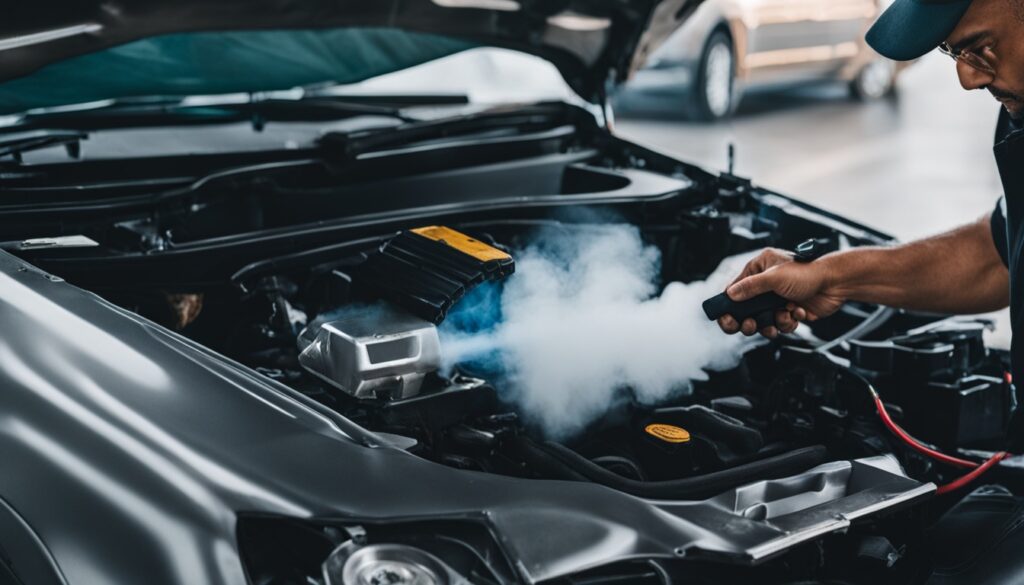
In summary, fixing your vehicle’s cooling system quickly and keeping it in good shape is key to avoiding more damage and expensive engine replacements. By dealing with overheating issues fast and sticking to the recommended service schedule, you can make your engine last longer and keep it running well.
Conclusion
Engine overheating is a common problem that can cause a lot of damage to your car. Understanding the main causes and knowing the signs can help us avoid costly repairs19. Keeping up with maintenance, driving carefully, and fixing problems quickly are important for a healthy cooling system20.
Fixing issues like not enough coolant19, bad thermostats19, and leaks19 helps prevent overheating. Using good coolants and checking coolant levels keeps the system working right21. By being alert and fixing problems fast, we can save money and keep our cars running19.
Being proactive about preventing engine overheating is key. This means regular maintenance, careful driving, and fixing issues on time. Taking care of our cooling systems is a smart move that saves us from big repair bills and hassle20.
FAQ
What are the common causes of engine overheating?
How can radiator problems lead to engine overheating?
What kind of damage can engine overheating cause?
What are the signs that an engine is overheating?
What should you do if your engine starts to overheat?
How can regular maintenance help prevent engine overheating?
How can driving habits contribute to engine overheating?
Why is it important to have engine overheating issues repaired in a timely manner?
Source Links
- https://www.tiresplus.com/blog/maintenance/why-is-my-car-overheating/ – Why Is My Car Overheating?
- https://thegarageba.com/6-most-common-reasons-your-car-overheats/ – 6 Most Common Reasons Your Car Overheats – The Garage BA
- https://masterauto.tech/how-to-troubleshoot-why-your-engine-is-overheating/ – How to Troubleshoot Why Your Engine Is Overheating
- https://www.mariettawrecker.com/blog/2023/06/06/is-your-engine-overheating/ – Is Your Engine Overheating? Here Are Do’s & Don’ts | Blog
- https://www.chapelhilltire.com/is-my-car-engine-overheating/ – 6 Signs Your Engine is Overheating
- https://www.bridwellautocenter.com/overheating-car-symptoms/ – Overheating Car Symptoms – Bridwell Automotive Center
- https://www.aamcoknoxville-stekoialane.com/Blog/Article/Spotting-the-Signs-of-an-Overheating-Transmission – When the Temperature Rises: Spotting the Signs of an Overheating Transmission
- https://www.siouxfallsford.com/blog/2023/march/9/what-to-do-when-your-car-overheats.htm – What to Do When Your Car Overheats
- https://www.fordlincolncharlotte.com/blogs/594/car-safety-tips/what-to-do-if-your-car-overheats/ – What To Do If Your Car Overheats – Mark Ficken Ford Lincoln Blog
- https://www.foxrunauto.com/blog/7-tips-to-prevent-your-engine-from-overheating – 7 Tips to Prevent Your Engine from Overheating – Fox Run Auto Inc.
- https://www.hulldobbsfordbirmingham.com/how-to-deal-with-car-overheating-tips-to-keep-your-engine-cool.html?srsltid=AfmBOorYjUuGIGDhGYAzp3-eZKJxlw0fnk97u1lOodr3zl7nSUhm0Q_Z – How To Deal With Car Overheating: Tips To Keep You
- https://blog.nationwide.com/vehicle/vehicle-maintenance/how-to-keep-your-car-from-overheating/ – Tips to Keep Your Car from Overheating
- https://living.geico.com/driving/auto/auto-care/overheating/ – What To Do If Your Car Overheats
- https://www.rac.co.uk/drive/advice/driving-advice/driving-habits-that-damage-your-car/ – 10 driving habits that are damaging your car | RAC Drive
- https://proremapping.com/preventing-car-overheating/ – Preventing Car Overheating: Essential Advice for Drivers – Pro Remapping
- https://killiansauto.com/cooling-system-repair-keeping-your-engine-chill-and-thriving/ – Cooling System Repair: Keeping Your Engine Chill And Thriving – Killian Automotive
- https://andysgarageauto.com/5313-2/ – Staying Cool: The Ins and Outs of Cooling System Repair – Andy’s Garage
- https://heartautocare.com/avoid-engine-damage-with-timely-coolant-flushes/ – Avoid Engine Damage with Timely Coolant Flushes | HEART Certified Auto Care
- https://india.gulfoilltd.com/blog/engine-overheating – Causes, Warning Signs & Prevention Tips
- https://www.frankfortford.com/blog-deciphering-car-overheating-mysteries-at-frankfort-ford-a-guide-to-smooth-rides.htm – Is Your Car Overheating? Frankfort Ford’s Guide to Smooth Rides
- https://www.ueautotechs.com/blogs/news/5-reasons-why-your-car-engine-overheats?srsltid=AfmBOorChila3ijdApxMkWb768EWqDk0Im_3CDKFlGzJzdfuBIIfhiCY – 5 Reasons Why Your Car Engine Overheats
